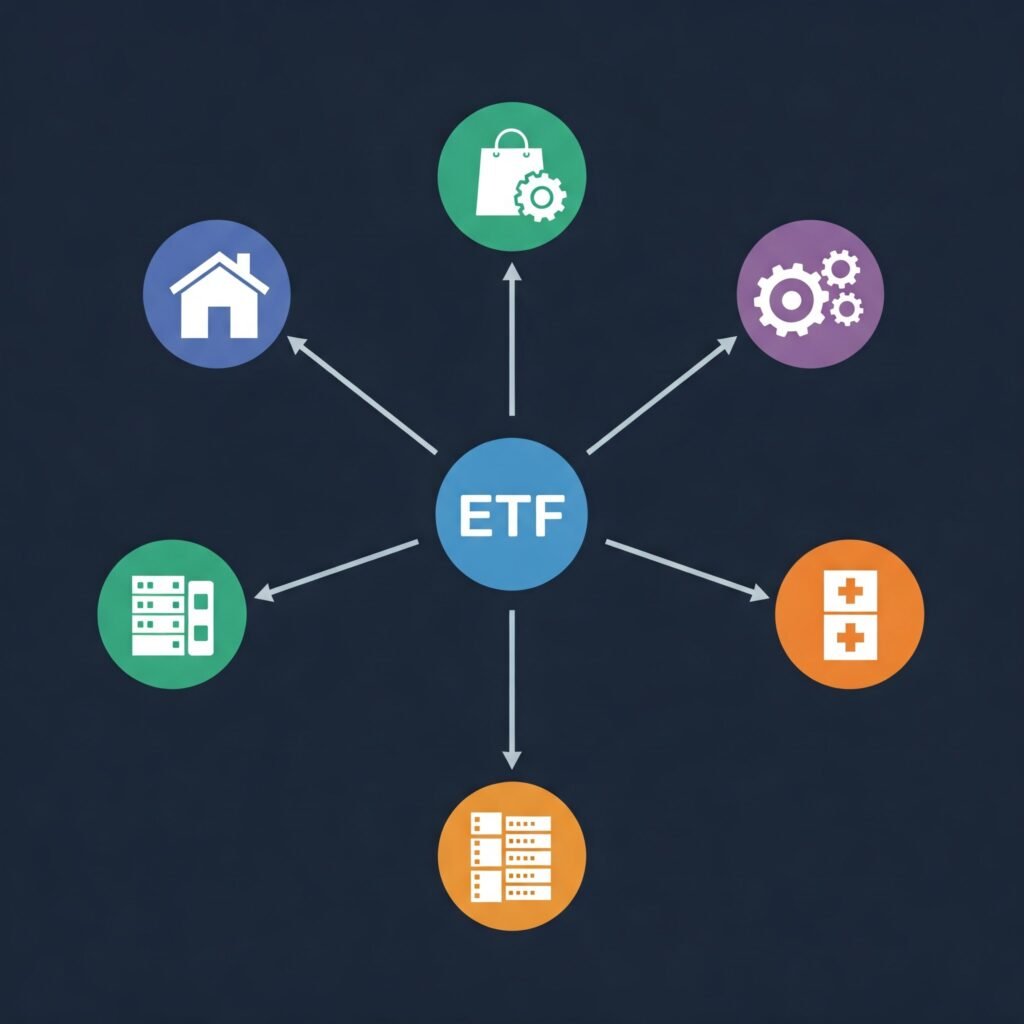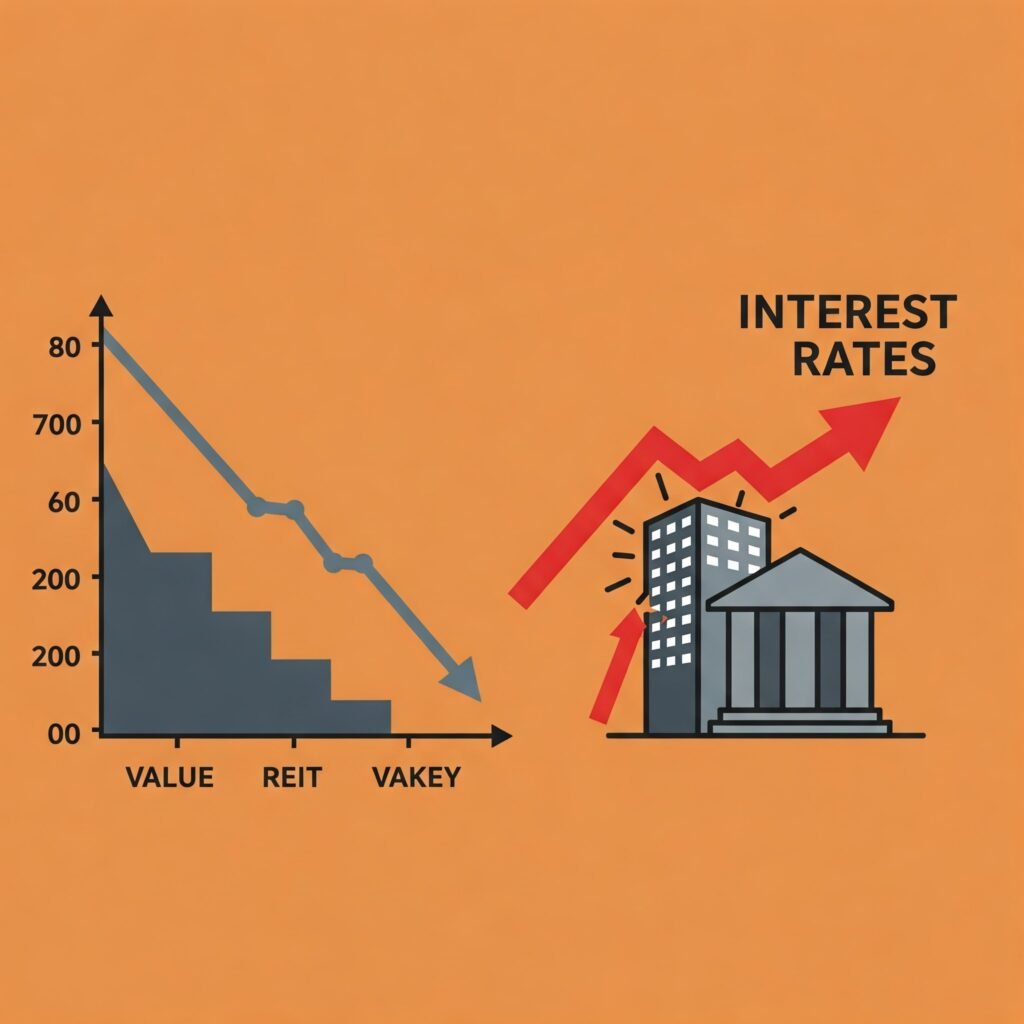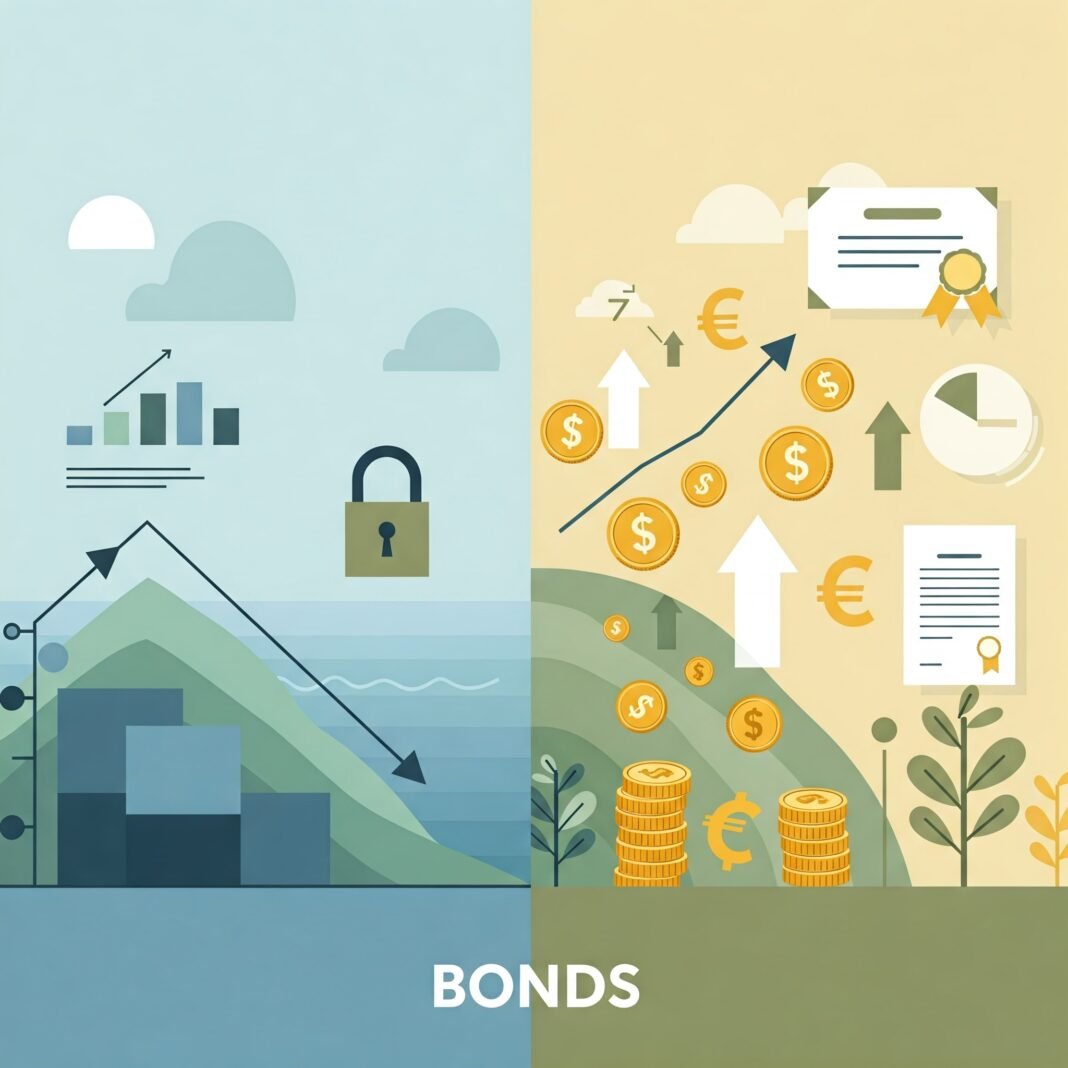Let’s talk real estate investing. Owning physical property can be rewarding, but it often requires significant capital, involves managing tenants, and isn’t exactly easy to buy or sell quickly. What if there was a way to get exposure to the real estate market without the hassle of being a landlord? Enter What Are REIT ETFs, a popular investment vehicle that offers a different path into the property world.
But beyond just understanding what they are, a crucial question remains: Should you invest in REIT ETFs? In this guide, we’ll break down these funds, explore their benefits and drawbacks, and help you figure out if they have a place in your investment portfolio.

- Description: A visually appealing image that blends financial charts or stock market graphics with subtle real estate elements like building silhouettes or a diverse city skyline. The style should be clean, modern, and trustworthy. Use a color scheme that feels stable and professional (e.g., blues, greens, subtle grays). The emotional tone should be one of opportunity and accessibility in investing.
Understanding What Are REITs and REIT ETFs
Before we dive into the ETF wrapper, it’s essential to understand the underlying asset: REITs.
Breaking Down REITs (Real Estate Investment Trusts)
Think of a Real Estate Investment Trust (REIT) as a company that owns, operates, or finances income-producing real estate across a range of property sectors. These can include:
- Apartment complexes
- Shopping malls
- Office buildings
- Hotels
- Data centers
- Infrastructure (like fiber cables and cell towers)
- Timberland
- Healthcare facilities
By law, REITs must distribute a significant portion of their taxable income (at least 90%) to shareholders annually, typically as dividends. This makes them attractive to income-focused investors. REITs are often publicly traded on major stock exchanges, making them more liquid than physical real estate.
How REIT ETFs Offer Diversified Real Estate Exposure
While you can buy individual REIT stocks, an Exchange Traded Fund (ETF) bundles together shares of multiple REITs. What Are REIT ETFs? They are investment funds traded on stock exchanges, holding a diversified portfolio of various REITs.
- Diversification: Instead of putting all your money into one office building REIT, an ETF allows you to own small pieces of dozens, or even hundreds, of different REITs across various property types and geographical locations. This inherently reduces risk compared to owning a single property or single REIT stock.
- Accessibility: ETFs trade like stocks, meaning you can buy and sell shares easily through a brokerage account throughout the trading day.

- Description: An infographic-style image showing the concept of diversification within a REIT ETF. Visual elements could include icons representing different types of properties (apartments, malls, offices, data centers) all flowing into a single abstract container labeled “REIT ETF,” perhaps alongside a simple line graph showing a diversified portfolio versus a single asset. The style should be clear, informative, and slightly technical but easy to grasp.
The Benefits of Investing in REIT ETFs
Now that you know What Are REIT ETFs, let’s look at why investors consider them.
Why Consider Investing in REIT ETFs?
Investing in REIT ETFs offers several compelling advantages:
- Diversification: As mentioned, you get exposure to a broad range of real estate sectors and locations within a single investment. This helps smooth out returns and reduce the impact of a downturn in any one property type or region.
- Liquidity: Unlike physical real estate, which can take months to sell, REIT ETF shares can be bought or sold quickly on a stock exchange during market hours.
- Potential for Income: Because REITs must distribute a large portion of their income, REIT ETFs often provide attractive dividend yields, offering a potential stream of passive income.
- Professional Management: ETFs are managed by professionals who select and maintain the portfolio of REITs according to the fund’s objective (e.g., tracking a specific real estate index). You don’t need to research and pick individual REITs yourself.
- Lower Investment Threshold: You can start investing in REIT ETFs with a relatively small amount of capital compared to buying physical property or even large blocks of individual REIT shares.
Accessibility and Professional Management
The ease of access through brokerage accounts and the professional management are significant draws for many investors looking to add real estate exposure without the complexities of direct ownership or picking individual stocks.
Potential Risks When Investing in REIT ETFs
No investment is without risk, and investing in REIT ETFs is no exception.
What to Watch Out For When Investing in REIT ETFs
Here are some potential downsides:
- Market Risk: Like all stocks and ETFs, the value of REIT ETFs can fluctuate based on overall stock market movements, investor sentiment, and economic conditions.
- Interest Rate Sensitivity: REIT performance can be sensitive to interest rate changes. Rising interest rates can increase borrowing costs for REITs and make their typically attractive dividend yields less appealing compared to bonds or other fixed-income investments.
- Property Market Risk: While diversified, REIT ETFs are still tied to the performance of the underlying real estate market. A downturn in the property market can negatively impact the value of the ETF’s holdings.
Other Considerations
- Fees (Expense Ratio): ETFs charge an expense ratio, which is an annual fee expressed as a percentage of your investment, to cover management and operating costs. While generally lower than actively managed mutual funds, these fees still impact your overall return.
- Specific Property Type Exposure: Some REIT ETFs might be concentrated in specific sectors (e.g., residential, retail, industrial). Ensure the ETF’s holdings align with your desired exposure and risk tolerance.

- Description: A visual representation of potential risks. This could be a simple chart showing potential volatility, or icons representing factors like interest rates (an upward-trending arrow with a percentage sign) or a declining property value (a house icon with a downward arrow). The style should be cautionary but informative, perhaps using warmer or orange/red tones subtly to indicate risk.
Should You Invest in REIT ETFs? Weighing the Decision
So, after considering What Are REIT ETFs and their characteristics, the big question is: are they right for you?
Are REIT ETFs Right for Your Portfolio?
Adding REIT ETFs to your portfolio can make sense for investors who:
- Want exposure to the real estate market but prefer not to own physical property.
- Seek potential income through dividends.
- Value diversification within the real estate sector.
- Prefer the liquidity of publicly traded securities.
- Are comfortable with the risks associated with market fluctuations and interest rate sensitivity.
Factors to Consider Before Investing in REIT ETFs
Ask yourself:
- What are my investment goals? Am I focused on income, capital appreciation, or both?
- What is my risk tolerance? Can I handle potential fluctuations in value?
- What is my time horizon? Am I investing for the short or long term?
- How much do I want to allocate to real estate? Consider REIT ETFs as part of your overall asset allocation strategy.
- Have I researched the specific ETF? Look at its holdings, expense ratio, historical performance (though past performance is not indicative of future results), and the index it tracks.
It’s often wise to consult with a financial advisor to determine if investing in REIT ETFs aligns with your personal financial situation and goals.
How to Start Investing in REIT ETFs
If you decide that investing in REIT ETFs is right for you, the process is straightforward:
- Open a brokerage account: If you don’t have one, you’ll need an investment account with a brokerage firm.
- Fund your account: Deposit money into your brokerage account.
- Research REIT ETFs: Look for ETFs that track broad real estate indices or focus on specific sectors you are interested in. Consider their expense ratios and holdings.
- Place an order: Use your brokerage account platform to search for the ETF by its ticker symbol and place a buy order for the desired number of shares.
Examples of Popular REIT ETFs (For illustrative purposes only)
While this is not a recommendation to buy or sell any specific investment, here are a few examples of well-known REIT ETFs that track different segments of the market:
- Vanguard Real Estate ETF (VNQ): Tracks a broad index of US REITs. [https://investor.vanguard.com/etf/profile/vnq](https://www.google.com/search?q=https://investor.vanguard.com/etf/profile/vnq) (Outbound Link Example)
- Schwab U.S. REIT ETF (SCHH): Another popular ETF tracking US REITs. [https://www.schwabassetmanagement.com/products/schh](https://www.schwabassetmanagement.com/products/schh) (Outbound Link Example)
- iShares Core U.S. REIT ETF (USRT): Tracks a different index of US REITs. [https://www.ishares.com/us/products/239752/ishares-core-us-reit-etf-fund](https://www.google.com/search?q=https://www.ishares.com/us/products/239752/ishares-core-us-reit-etf-fund) (Outbound Link Example)
- Note: Performance, fees, and holdings can change. Always do your own research.
- (Image Placeholder 4)
- Description: An image that visually represents the act of investing or financial growth related to real estate. This could show a hand placing a small building block or miniature house onto a rising bar chart, or a simple graphic of growth within a diverse portfolio circle. The style should be positive and forward-looking, using colors associated with growth (like green) and stability.
- Conclusion: Weighing What Are REIT ETFs for Your Future
- Understanding What Are REIT ETFs is the first step towards deciding if they fit into your investment strategy. They offer a convenient, diversified, and potentially income-generating way to access the real estate market without the complexities of direct property ownership.
- However, like all investments, they come with risks, including market volatility and interest rate sensitivity. By carefully considering your financial goals, risk tolerance, and doing your research, you can make an informed decision about whether investing in REIT ETFs is the right move to help you build a well-rounded 1 portfolio.
- 1. imageproperty.com.au
- imageproperty.com.au





